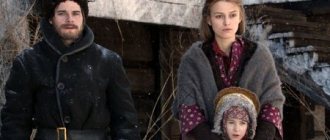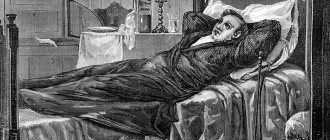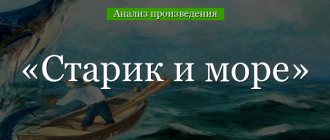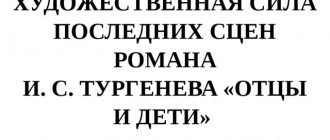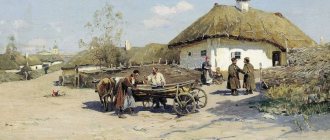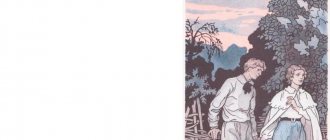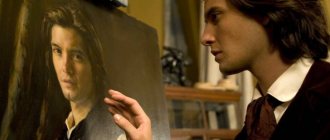The history of the creation of the novel "Doctor Zhivago"
Anna Akhmatova “pushed” Pasternak to think about creating a novel in May 1944, when she invited him to write “Faust” of the twentieth century. And Boris Leonidovich agreed. Only he wrote not as expected from him, but in his own way. After all, Yuri Zhivago, like Faust, is dissatisfied with himself, with his life and strives to change it. But not by making a deal with the devil, but by painstaking work on your soul and its moral principles.
The moral principle in those difficult years was needed more than ever. Time dictated its conditions, but not everyone sought to silently accept them. Pasternak was tormented by a feeling of some kind of persecution and powerlessness. Repressions, arrests, suicides. Unbearable. The “insatiable machine” consumed everything in its path, leaving no chance of survival. That is why in Doctor Zhivago the entire life of the main characters is literally permeated with suffering, mental anguish, uncertainty and poverty. However, Pasternak sincerely believed that the “red monster” would sooner or later moderate his ardor and change his anger to mercy. But things only got worse. Soon it reached Boris Leonidovich himself. The party leadership began to actively suppress literature. Pasternak was not repressed, but in 1946 warnings began to be received against him as a poet who did not recognize “our ideology.” He did not fit into the official post-war art either as a poet or as a prose writer.
Despite everything that was happening, hard work on the novel continued. The titles changed one after another: “There will be no death,” “Boys and Girls,” “Innokenty Dudorov.” Yuri Andreevich could turn out to be Doctor Zhivult. It is interesting that Pasternak’s personal connections are also reflected in the novel. Olga Ivinskaya, for whom the author had tender feelings, becomes the prototype of Lara.
The ending of the novel
The Battle of Kursk takes place at the end of Pasternak's novel Doctor Zhivago. Analysis of the work is based on the characters’ perception of the events of the work.
The washerwoman Tanya appears before the readers, who tells her story to Zhivago’s childhood friends, Mikhail Gordon and Innokenty Dudorov. They survived the Gulag, Stalinist repressions and arrests.
It turns out that she is the illegitimate daughter of Lara and Yuri Zhivago. The main character’s brother, Evgraf, who became a major general during the Great Patriotic War, takes her under his wing.
Zhivago’s poems, which conclude the novel, play an important role in the text.
Journalistic fate of the book
"Through hardship to the stars". This phrase can describe the difficult path that the novel took to end up in the hands of its many readers. Why? Pasternak was refused publication of the book. However, in 1957 it was published in Italy. It was published in the Soviet Union only in 1988, when the author could no longer find out about it.
The story of the novel "Doctor Zhivago" is in some ways special. In 1958, Boris Leonidovich was nominated for the Nobel Prize, which he refused. In addition, a ban was imposed on the publication of the book, and this further fueled interest in the work. Readers expected something special from the novel. But later they were disappointed. This was not hidden even by Boris Pasternak’s close friends, among whom were quite famous writers A.I. Solzhenitsyn and Anna Akhmatova, who made a remark that sowed alienation between the poets.
Larisa
One of the key characters in Doctor Zhivago, without whom an analysis of the work would be incomplete, is Larisa. The reader meets a young girl who is patronized by the elderly lawyer Komarovsky. Larisa herself strives to break out of this captivity.
She has a childhood friend. Faithful and in love with her, Pasha Antipov. In the future, he will become her husband, and it is in him that Lara will find her true salvation. But immediately after the wedding, they cannot find happiness in their personal lives. As a result, Pavel leaves his family and goes to the front as a volunteer. Takes part in the First World War. There an amazing metamorphosis occurs to him. From a gentle man he turns into a formidable revolutionary commissar. Changes his last name. His new pseudonym is Strelnikov. After the Civil War ends, he strives to reunite with his family, but this never comes true.
Meanwhile, fate brings Yuri and Larisa together. Their relationship is key to the analysis of the novel “Doctor Zhivago” by Pasternak. On the fronts of the First World War, they meet in a small village with the unsightly name Melyuzeevo. Zhivago works there as a military medic, and Larisa is a nurse who dreams of finding her missing husband.
The next time their paths cross in the fictional Ural town of Yuryatin. Perm serves as its prototype. They are fleeing there from the hardships of the revolution. The characters fall in love with each other. The outbreak of the Civil War leaves its mark on the lives of the heroes. Hunger, repression and poverty separate not only Lara’s family, but also Yuri’s. Zhivago’s wife remains in Moscow and writes to her husband in the Urals about possible forced deportation outside the country in the near future. Meanwhile, the power of the revolutionary councils is raging, Zhivago and Lara take refuge for the winter in the Varykino estate. Suddenly, Komarovsky, who received a post in the Ministry of Justice in the barely formed Far Eastern Republic, appears there. Komarovsky manages to convince Zhivago to let Lara go with him so that she can flee to the east and then find safety abroad. Yuri Andreevich agrees to this, clearly understanding that he will never meet his love again.
Genre of the novel "Doctor Zhivago"
It is difficult to define the genre of a novel unambiguously. The work can be considered autobiographical, since it contained the main milestones of the writer’s life. We can safely say that the hero of the novel, who finds himself in the whirlpool of ongoing events and subtly senses the world around him in all its changes and vibrations, is the second “I” of Boris Pasternak.
At the same time, the novel is also philosophical, since questions of existence occupy an important place in it.
The work is also interesting from a historical point of view. Pasternak correlates his novel with a true picture of life. “Doctor Zhivago” is Russia, shown to us as it really is. From this point of view, the artist’s book is a traditional realistic work that reveals a historical era through the destinies of individual people.
In terms of its metaphorical nature, imagery, symbolism and poetics, Doctor Zhivago is a novel in verse and prose.
For most, this is a “love story” with an entertaining plot.
Thus, we have before us a multi-genre novel.
Poems by Zhivago
Analysis of Doctor Zhivago's poems helps to better understand the very essence of this novel. The central text in this cycle is “Winter Night”.
Researchers propose to consider it in the context of the struggle for survival. At the same time, the February blizzard is associated with death, and the flame of a candle with future life. At this time, Doctor Zhivago is already experienced and mature enough to accept the reality around him. At the same time, he continues to believe in beauty, hope for the best glimmers in his soul.
Composition "Doctor Zhivago"
As soon as we begin to get acquainted with the book, from the very first chapter our consciousness puts a tick in front of the “structural elements of composition” item. One of them is the protagonist’s notebook, which has become a harmonious continuation of his prose beginning. The poems confirm the tragic perception of reality by the author and Doctor Zhivago, and reveal the overcoming of tragedy in creativity.
The author draws parallels between the characters, compares them, shining through their souls like an X-ray, and closes them on Yuri Andreevich.
An important compositional feature of the novel is the accumulation of chance encounters, unexpected turns of fate, various coincidences and coincidences. The heroes of the novel often think that such life turns are in principle impossible and incredible, that this is some kind of dream, a mirage that will disappear as soon as they open their eyes. But no. Everything is real. It is noteworthy that without this the action of the novel could not develop at all. It is not for nothing that the “poetics of coincidence” declares itself. It is justified by the artistic originality of the work and the worldview of the author, who strives to convey to the reader his vision of a particular situation as accurately as possible.
In addition, the structure of the novel is based on the principle of cinematic editing, the selection of independent scenes - frames. The plot of the novel is built not on the acquaintance of the characters and the further development of their relationship, but on the crossing of parallel and independently developing destinies.
Reviews of the book “Doctor Zhivago” by Boris Pasternak
Poetics, tragedy and symbolism
I finished reading at about six in the morning and have been trying all day to comprehend what I read, to organize my impressions... it doesn’t turn out very well, the novel evoked too many emotions.
He is so contradictory that, it seems to me, it is simply impossible to evaluate him in the categories of “like/dislike.” Well, the whole range of sensations that arise during the reading process does not fit into them. It is both magnificent and full of flaws, it attracts and repels, irritates and delights, it is difficult to read, but does not let you put it down. It’s very difficult to sort out the feelings that arose while reading, so my review will probably be a little chaotic, but I’ll try. One of the most striking impressions is the incredible poetry and imagery of the text. It seems that Pasternak the poet greatly dominated Pasternak the prose writer. The result, in my opinion, was contradictory. On the one hand, the stunningly beautiful, spectacularly conveyed images gave the plot an additional, bright coloring. I wanted to re-read, savor, taste many phrases...
The clay huts and geese in the station settlement spattered with sunflowers turned white in fear under the motionless gaze of the black stormy sky...
...isn't that great? But on the other hand, there is so much poetics here that it simply buries the eventful part of the novel. Add here the numerous philosophical monologues of the characters, and it becomes clear what incredible efforts must be made in order not to lose the thread of the plot in this entire extravaganza of lofty verbal matters.
The abundance of characters that filled this work did not make reading easier either. New faces appear on the pages of the book with enviable regularity, some to stay here for a long time, and some to simply glide through the life of the main character. There are so many of them, both important characters and extras, that it was not always possible to keep everyone in mind. And a name that was encountered once and seemed to immediately leave the plot, suddenly suddenly popped up in other circumstances, forcing one to tensely remember why it seemed familiar. In general, there are too many random encounters and coincidences in the novel: wherever the characters’ lives take them, they are sure to meet acquaintances (or even just unexpectedly get together in a friendly group), and if they don’t meet them, they hear about them from third parties. Because of these constant intersections, there is a feeling of crampedness: as if what’s around is not vast Russia, but modest Liechtenstein, where everyone you meet is, if not a neighbor, then a relative.
Things didn’t work out for me with the main character either; he turned out to be too far from me. An essentially good person, smart, capable of deeply feeling, empathizing, experiencing constant mental anguish for his loved ones, he is at the same time absolutely passive, inactive and inert, goes with the flow, dooming people dear to him to suffering. Afraid by his decision to cause pain to one person, through inaction he causes it to everyone and he himself suffers, finding no peace. He is ready to suffer and sacrifice himself, but is not capable of action to change anything. But for the author, it seems that his hero is an ideal or very close to it, even with all his shortcomings. At least, during the course of the novel I often had the feeling that the world revolved around Yuri Zhivago, the rest were secondary. And this was not clear to me. Why him? Who is he? What he? An outstanding doctor, poet, writer, philosopher, husband, friend...? How is he different from others, except for the ability to dive incredibly deeply into high matters, while simultaneously trying to hide from reality? What he did, who he made happy, that everyone around him, both close people and unfamiliar citizens, strives to help out of the kindness of their hearts, to help out for free, to save, and all solely out of a good attitude towards the doctor. What did he do to deserve this? I even began to doubt that for some reason I had missed the moment when the hero acquired his exclusivity, some fact of his biography that raised him above the ordinary. No, our hero is humanly ordinary and not at all ideal. Moreover, his attitude towards others, revealed in one episode, rather deprives him of the right to use their help than makes him worthy of it:
Dear friends, oh, how hopelessly ordinary you are and the circle you represent, and the brilliance and art of your favorite names and authorities. The only living and bright thing about you is that you lived at the same time as me and knew me.
Is it worth commenting on such a statement? I doubted it for a long time, but... no, I don’t like this character, despite all its drama and spiritual depth.
So what is it about this novel that makes it so touching to the soul, captivating your attention and not letting go? Frankly, I didn’t fully understand this myself. Probably the general background, the atmosphere, when behind the verbose, suffocating imagery, an entire Era is hidden, and the doom of the depicted destinies is so piercing that a lump comes to the throat. Although here, too, one can argue that Pasternak is too original in the way he conveys the attitude of a collapsing world, and it is not always easy to understand and accept him. The same Bulgakov, for example, looks more convincing to me in describing such an atmosphere. The novel is also largely symbolic and allegorical, and using the example of his heroes, the author tries not only to show life at a turning point in times of great upheaval, but also to talk about life and death, about faith and spirituality, about choice, about destiny, perhaps. And it really came out strong, piercingly, with such incredible strain that it simply takes your breath away. One feels that the author literally suffered through his “Doctor Zhivago”, let it pass through him many times, and put his soul into it. And for this alone, the novel is already worthy of all praise.
Themes of Pasternak's novel
One of the main themes of the novel can be considered the theme of the relationship between personality and history, which are “equal quantities.” Various manifestations of personality can be embodied in philosophy, poetics and religion.
The theme of the path is another one of the leading ones in the novel. One strays from this path and goes to the side, and in an arc here he gains spiritual maturity, dooming himself to difficult thoughts in solitude. Which of them does Zhivago belong to? To the second. The doctor’s flight from half-frozen, hungry Moscow to the Urals is a forced step. Setting off on a journey, Yuri does not feel like a victim. He feels that he will find the truth and discover the hidden truth about himself. This is what happens. A creative gift, true love and philosophy of life - this is what a person gets who has escaped the boundaries of his consciousness, left the “safe haven”, and is not afraid to go into the unknown.
The author returns us to another side of reality - to man, elevating love as one of the most beautiful phenomena of life. The theme of love is another theme of the novel. It is literally permeated with love: for children, for family, for each other and for the Motherland.
The themes stated in the novel cannot be divided. They look like skillful weaving, which will immediately collapse if you remove even one thread. Nature, love, fate and the path seem to spin in a graceful dance, which gives us an understanding of the genius of this novel.
Problems in the novel
One of the main problems in the novel is the fate of a creative personality in the revolution.
The pursuit of truth entailed a clash of ideals with reality. Creativity collided with revolutionary reality and desperately defended itself. People were forced to defend their right to individuality. However, their desire for creative originality was brutally suppressed and took away any hope of liberation.
It is noteworthy that the text speaks of physical work as a real creative endeavor. The problem of beauty, the philosophy of femininity and even the “royalty” of a person engaged in simple labor is connected primarily with the image of Lara. In everyday chores - at the stove or at the trough - she strikes “the spirit with a breathtaking appeal.” Pasternak peers with admiration at the “beautiful, healthy faces” of “people from the people” who have worked on the earth all their lives. The writer managed to show the national character of the heroes. They not only love, think, act - their deep national roots are manifested in all their actions. They even talk “as only Russian people in Russia talk.”
The problem of love is connected with the main characters in the work. This love is fateful, destined for the heroes from above, but encountering obstacles in the form of chaos and disorder in the surrounding world.
The intelligentsia in the novel "Doctor Zhivago"
In the souls of the Russian intelligentsia of that time there lived a readiness for asceticism. The intelligentsia expected the revolution, imagining it rather abstractly, not realizing what consequences it could lead to.
Thanks to spiritual thirst and the desire to comprehend the world around him, Yuri Andreevich Zhivago becomes a thinker and poet. The hero’s spiritual ideals are based on a miracle: throughout his entire life he never lost the ability to perceive the world, human life and nature as a miracle! Everything is in life, and everything is life, only it was, is and will be. In this philosophy, two points attract attention and explain the reasons for the tragic state of affairs of the hero in his contemporary society: Yuri’s uncertain position and rejection of “violence.” The conviction that “one must attract with goodness” did not allow Zhivago to join any of the two warring parties, because violence was the basis of their programs of activity.
Strelnikov is portrayed in the novel as the antipode of Zhivago. He is a ruthless, irreplaceable reasoner, ready to confirm with his weighty proletarian word any, even the most cruel, sentence. His inhumanity was seen as a miracle of class consciousness, which ultimately led him to suicide.
The intelligentsia played an important role in the formation of revolutionary reality. The desire for novelty, change and a change in the ruling layer wiped off the face of the earth that thin layer of the real intelligentsia, which consisted of scientists, creative figures, engineers and doctors. New “individuals” began to replace them. Pasternak noticed how, in the putrid atmosphere of NEP, a new privileged layer began to take shape with a claim to an intellectual monopoly and continuity with respect to the old Russian intelligentsia. Returning to Moscow, Yuri Zhivago made a living cutting wood for wealthy people. One day he came in to pay. Yuri Andreevich’s books lay on the table. Wanting to look like an intellectual, the owner of the house read the works of Zhivago, but did not even deign to glance at the author himself.
Akhmatova and Shalamov about the shortcomings of Doctor Zhivago
“Grab a pencil and cross page after page”: why the first readers scolded the novel of the future Nobel laureate
Prepared by Nadezhda Biryukova
While writing Doctor Zhivago, Pasternak organized home readings, presenting versions of individual chapters to friends and acquaintances. Among the first listeners there was no clear assessment of the novel. Anna Akhmatova, Lydia Ginzburg, Alexander Gladkov, Vsevolod Ivanov, Anastasia Tsvetaeva and Korney Chukovsky, who did not accept Doctor Zhivago, expressed judgments, the general meaning of which Pasternak formulated in a letter to Valery Avdeev: “Almost all those close to me who appreciated my past characteristics are looking for they are not found here.”
Korney Chukovsky: “Yesterday evening the Leonovs were with us, and at that time I was at a reading with Pasternak. He has long wanted to read me the novel he is writing now. <...> I didn’t understand his novel well, because in the evening I don’t know how to listen, I get tired during the day by eight o’clock, but for all the charm of individual parts, mainly related to childhood and descriptions of nature, it seemed to me extraneous, confusing, far from my existence - and too much in it did not evoke any participation in me.”
Anna Akhmatova: “There are pages that are completely unprofessional. I believe they were written by Olga. That is, Olga Ivinskaya, Pasternak’s beloved.. Don’t laugh. I'm talking seriously. I... never had any editorial aspirations, but here I wanted to grab a pencil and cross page after page. And in this same novel there are landscapes... I responsibly assert that they have no equal in Russian literature. Neither Turgenev, nor Tolstoy, nor anyone. They are as brilliant as a hazel tree.”
Alexander Gladkov: “There are amazing pages in Doctor Zhivago, but how much more there would be if the author did not try to write a novel, but wrote broadly and freely about himself, his time and his life. Everything in the book that is from the novel is weak: people do not speak or act without the author’s prompting. All the conversations of the intellectual heroes are either a naive personification of the author’s thoughts, clumsily disguised as dialogue, or an inexperienced fake. All the “folk” scenes are almost false in language: B. L. does not hear this (episodes in the carriage, among the partisans, etc.). The novel-plot moves are also naive, conventional, strained, and smack of concoction or imitation.”
Ariadna Ephron: “First, I’ll tell you about what bothered me, or about what is not entirely clear to me, or about what I do not completely agree with. Firstly, the cramped conditions are terrible. To cram so many destinies, eras, cities, years, events, passions into 150 pages of typescript, depriving them of the absolutely necessary “cubic capacity”, the necessary space and space, air. And this is not an accident, it did not just write itself. <...> It turns out that all these people: Lara, Yuri, Tonya, and Pavel - they all live on another planet, where time is subject to different laws, and our 365 days are equal to one of them. Therefore, they have no time for empty talk, no carefree, simple days, what the French call détente, they do not say stupid things and do not joke - like we do on earth. <...> Always - and this time - your skill in defining the indefinable - taste, color, smell, the sensations they evoke, moods, memories, is almost frightening, and this is at a time when we would give our heads to cut off what words for this no, not yet found or already lost.”
Varlam Shalamov: “It’s been a long time since I read anything Russian in Russian that corresponds to the literature of Tolstoy, Chekhov and Dostoevsky. “Doctor Zhivago” certainly lies in this grand plan. <…> I like so many places in the book that it’s hard to name the best. Perhaps, after all, this is a piece from Vedenyapin’s diary - about Rome and Christ. I copied this wonderful piece for myself and will learn it. <...> Now about what torments me, what is so disharmonious in the book, what for some reason exists along with the most important thoughts, with the most subtle and wonderful observations of nature, subjugated and subordinated to the moods of the heroes, with the unity of the moral and physical world, brilliantly achieved, carried out many times in the novel. About a rude phenomenon, sharply screaming, falling out of the entire musical key of the novel. I'm talking about the language of the common people in your novel. It is about the language, and not the psychological justification of the actions of these people. Your people’s language—it doesn’t matter whether they are workers, peasants, or city servants—your people’s language is lubok, nothing more. In addition, in your case it is the same for all these groups, which cannot be the case even now, and even more so before, given the greater disunity of these population groups.”
Lydia Chukovskaya: “Reading. Everything from within is a miracle. A miracle as long as it is from the inside. The strike was given from the outside, and although it was good, the miracle ends there. He reads passionately, as if “life hangs by a thread,” but with all his might.”
Revolution and Christian motives
“The grain will not sprout if it does not die,” Pasternak loved this gospel wisdom. Finding himself in the most difficult situation, a person still cherishes the hope of revival.
The author sought to remain faithful to the gospel covenant: “live like the birds of the air,” that is, in love and harmony, in peace and respect.
According to many researchers, B. Pasternak’s personality model is Christ-oriented. Yuri Zhivago is not Christ, but the “centuries-old prototype” is reflected in his fate.
To understand the novel, it is necessary to understand the author's approach to the Gospel and to the revolution. In the Gospel, Boris Pasternak perceived, first of all, love for one's neighbor, the idea of personal freedom and an understanding of life as a sacrifice. It was with these axioms that the revolutionary worldview, which permitted violence, turned out to be incompatible.
In his youth, the revolution seemed like a thunderstorm to Pasternak’s hero; there seemed to be “something evangelical” in it - in scale, in spiritual content. The spontaneous revolutionary summer gave way to the autumn of collapse. The bloody soldiers' revolution frightens Yuri Zhivago. Contrary to this, admiration for the idea of revolution breaks through with sincere admiration for the first decrees of the Soviet government. But he looks at what is happening soberly, becoming more and more convinced that reality is at odds with the proclaimed slogans. If at first Zhivago the doctor thought surgical intervention was justified for the sake of healing society, then, disappointed, he sees that love and compassion disappear from life, and the desire for truth is replaced by concerns about benefit.
The hero rushes between two camps, rejects the violent suppression of the individual. A conflict develops between Christian and new morality based on violence. Yuri finds himself “neither one nor the other.” The fighters repulse him with their fanaticism. It seems to him that outside of the fight they don’t know what to do. War consumes their entire essence, and there is no place for creativity and no need for truth.
Nature in Doctor Zhivago
Man is part of nature. The natural world in the novel is animated and materialized. He does not rise above a person, but seems to exist in parallel with him: he grieves and rejoices, excites and calms, warns of impending changes.
The tragic scene of the funeral of Yura's mother opens the work. Nature, together with people, mourns for a good person. The wind sings a mournful song in unison with the farewell singing of the funeral procession. And when Yuri Andreevich passes away, some flowers become a replacement for the “missing singing.” The earth takes the “departed” into another world.
The landscape in the novel is also a picturesque picture that gives rise in the human soul to feelings of admiration and enjoyment of beautiful nature. “You can’t stop looking at it!” - How can you live and not notice this beauty?
Favorite image is the Sun, which “shyly” illuminates the area, being a special attraction. Or, “settling behind houses,” it casts red strokes on objects (a flag, traces of blood), as if warning of impending danger. Another generalizing image of nature is a calm, high Sky, conducive to serious philosophical reflection, or, flashing with a “pink, trembling fire,” empathizing with the events taking place in the human community. The landscape is no longer depicted, but acts.
A person is assessed through nature; comparison with it allows us to create a more accurate description of the image. So Lara, from the point of view of other characters, is “a birch grove with clean grass and clouds.”
Landscape sketches are exciting. White water lilies on the pond, yellow acacia, fragrant lilies of the valley, pink hyacinths - all this on the pages of the novel exudes a unique aroma that penetrates the soul and fills it with burning fire.
